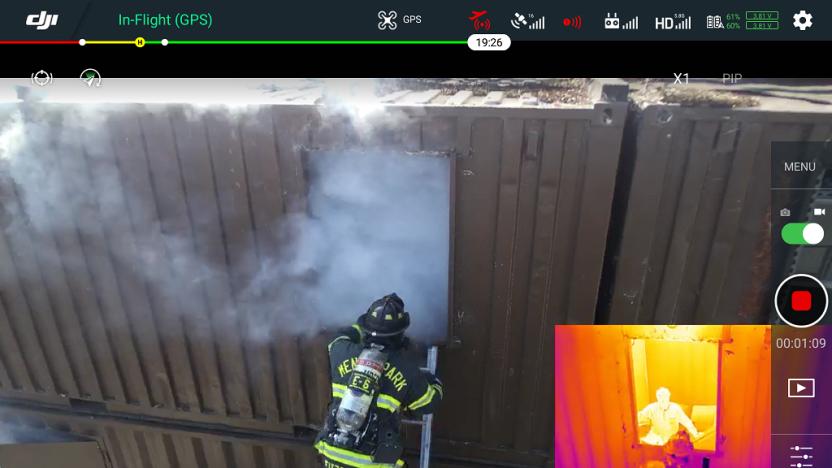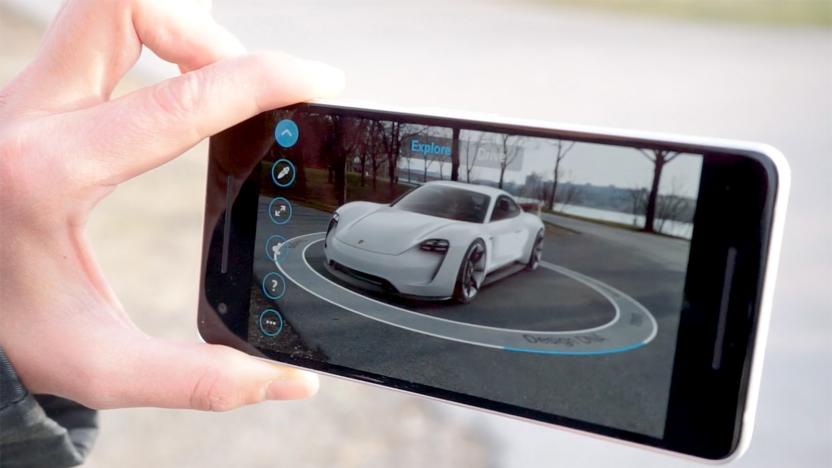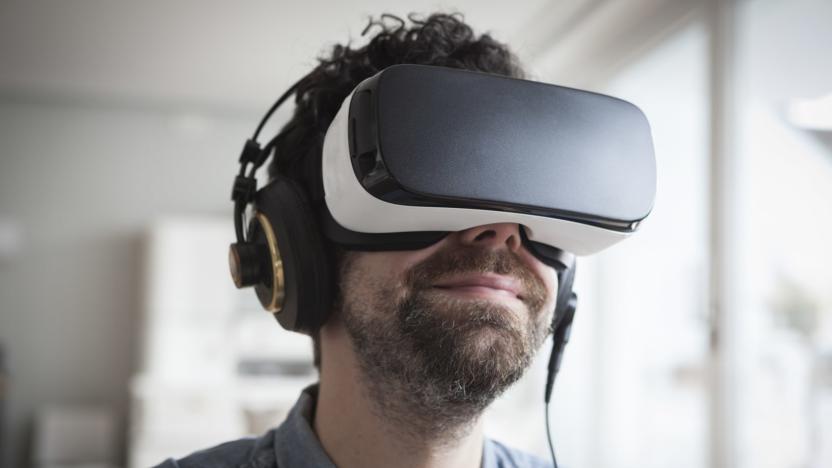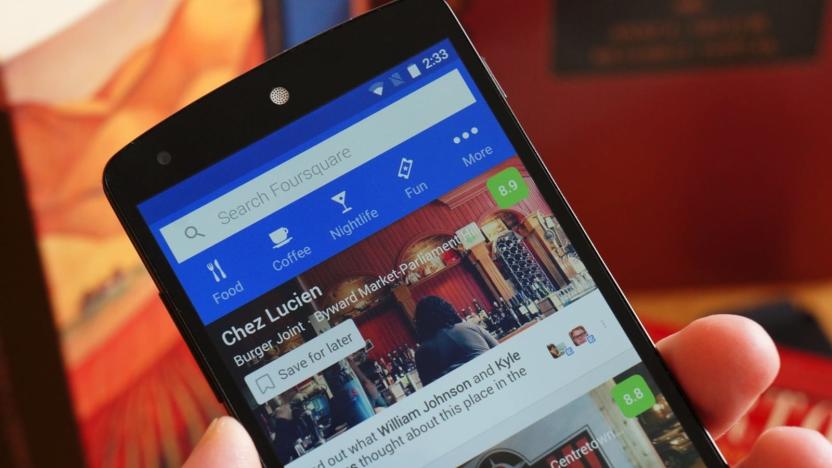sdk
Latest

DJI will let developers fully customize its drones
Drone company DJI is expanding its efforts in the commercial sector with a new thermal imaging camera and a payload software development kit (SDK) that will allow startups and developers to integrate custom gear onto DJI drones.

Android's official augmented reality toolkit is available to the public
Google's take on a mobile augmented reality framework is no longer limited to a modestly-sized preview. It just released ARCore 1.0, letting anyone publish Android apps that take advantage of the toolkit to meld virtual objects with the real world. To no one's surprise, Google has already lined up apps from big-name brands to take advantage of the new platform. Snapchat has an AR "portal" that takes you inside FC Barcelona's Camp Nou stadium, while Porsche lets you explore the Mission E Concept as if it were parked in front of you. A number of games (such as Ghostbusters World and a range of titles from NetEase) and home furnishing apps (Sotheby's, JD.com, Easyhome and Otto) are also on tap.

Amazon brings Alexa to headphones and smartwatches
Amazon is integrating Alexa with services that help around the house, from turning on the microwave to charging your plugged-in EV. For its next trick, the tech giant wants to push its voice assistant into devices you take on the go. Today, Amazon introduced the 'Alexa Mobile Accessory Kit,' software that lets developers hook up their Bluetooth-equipped wearables and headphones to the voice-controlled service.

Google enables third-party Assistant devices in Japan and the UK
The Assistant SDK is the key to enabling Google's AI helper in third-party devices. It's a big deal, then, that it's now available in more corners of the world. Google has expanded the developer toolkit's support to several new countries, including Australia, Canada (both English and French), Germany, Japan and the UK. While Assistant-enabled devices have certainly been available in other countries, this makes it easier for hardware companies in those countries to get the ball rolling and cater to local audiences. On top of this, the SDK itself is becoming more powerful.

Magic Leap One: All the things we still don’t know
It's that time of year again: the special season when everybody's favorite mythical creature makes its annual appearance. That's right, it's Magic Leap hardware teaser season! Seemingly once a year, the secretive startup reveals what it's been up to, and on Wednesday it revealed renderings of its latest AR headset prototype. The company even deigned to allow a Rolling Stone reporter to take the system for a spin. But for everything that Magic Leap showed off, the demonstrations and teaser materials still raise as many questions as they answer. There's a whole lot about the Magic Leap system that we don't know, so maybe let's hold off on losing our minds about the perceived imminent AR revolution until we do.

Google built a spatial audio kit for games and VR
Immersive audio is particularly important in an era where games are mainstream and virtual reality is quickly catching on, but there isn't a common framework for it. What works on your PC may be useless on your phone. Google wants to fix that: it's launching Resonance Audio, an open source developer toolkit that brings spatial audio to games, VR, AR and 360-degree video across many devices and platforms: Android, iOS, macOS, Linux and Windows are all covered. The technology borrows from Google's VR Audio kit to spatialize "hundreds" of 3D sound sources in real time, even on low-powered hardware like your smartphone. And depending on where it's running, it can even produce clever effects with a relatively low performance hit.

Google unveils ARCore, its answer to Apple’s ARKit
A few months ago at WWDC, Apple unveiled ARKit, the company's first-ever attempt at an augmented reality platform. With it, developers could weave AR apps with relative ease, especially since any iOS 11 device would be compatible with it. Examples so far include a "Take On Me" style music video, a virtual pet game, a restaurant app that can display virtual food on a plate and many, many more. If that sounds pretty impressive to you, well, Google must've thought so too. That's because it's coming out with its very own augmented reality platform, and it's called ARCore.

Foursquare lets other apps use its core location tech
Foursquare has been willing to offer its place data to outside partners, but it has long kept its location awareness tech, Pilgrim, close to the vest. Now, though, it's opening things up: the company has released a developer kit for Pilgrim, letting other apps take advantage of Foursquare's positional wizardry. The tools help apps determine where you are down to the building level (without even opening the app), and let them act accordingly. A fitness app could plan an exercise routine based on where you ate, for instance, while a location-based game could adapt its experience around your neighborhood or the local store.

Google makes its essential Android modding tools easier to get
Android users have a long history of unlocking their phones, sideloading apps and installing custom OS builds -- but getting the tools to do all that has always been kind of a pain in the ass. Users who wanted to play around with their phone's backend had to download the entire Android SDK just to get access to two specific tools. Not anymore. Google has quietly released its ADB and Fastboot tools as lightweight, independent packages.

Microsoft's Amazon Echo competitor will launch next year
Microsoft is partnering with the (soon-to-be Samsung-owned) audio company Harman Kardon to launch a speaker with its Cortana personal assistant built in. Described as "a voice-activated speaker," a short teaser video shows glimpses of a (rendered) cylindrical design not too dissimilar to Amazon's Echo. It also takes cues from Google Home, with a display atop fashioned after Cortana's familiar blue circle that shows when the assistant is thinking.

ICYMI: Segway's plan B and flexible concrete
try{document.getElementById("aol-cms-player-2").style.display="none";}catch(e){}Today on In Case You Missed It: Segway came to Intel's Developer's Forum to show a prototype for a self-balancing scooter that is also a robot. If the public SDK works out well, Segway hopes to release a consumer version of whatever it becomes in 2017.

Cozmo the tabletop robot will be user-programmable
Cozmo, a diminutive robot companion, packs some impressive technology and will be far more customizable than originally expected when it's released this fall. Anki announced on Monday that Cozmo will launch with an SDK, enabling users to leverage it as a programming platform as well as an adorable sidekick.

Create Facebook profile videos with Vine, Boomerang and more
Facebook flipped the switch on profile videos last fall, and now its allowing you to upload those short clips from third-party apps. The social network announced the Facebook Profile Expression Kit at F8, an SDK that will allow app developers to build in tools that allow users to set video creations as a moving profile image. There's already a handful of apps that support the profile videos during the initial beta phase, including MSQRD, Boomerang from Instagram and Vine. Once you make your video, you'll now have the option of setting it as your main Facebook profile visual with just a few taps.

Muzik wants its smart headphones to do more than just share
Muzik's smart headphones are set to arrive this spring, and the company is looking for more apps to integrate with its newfangled cans. Thanks to a hand from Microsoft, Muzik launched an SDK for Windows 10, iOS and Android that will allow apps and services to make use of the headphones' smart keys. Muzik already announced the audio gear would allow to you share what you're listening to via social networks, and the folks at Microsoft used the SDK to allow sharing to Slack as well.

Anyone can turn their Xbox One into a software dev kit
The dream of turning your Xbox One into a software development kit is finally real. Xbox chief Phil Spencer announced today during today's Build keynote that the process will be pretty simple, too. Essentially, you just download the Xbox Dev Mode app, register as a developer and that's it. From there, you can swap back and forth between a retail game and whatever app you're working on, be it a game or something else.

Twitter adds Unity support to its mobile development toolkit
Game developers with a love for Unity and social networking just got a little present: Twitter has announced Unity support for its mobile software development toolkit. For most of us, this simply means looking forward to more mobile games with Twitter integration -- but for developers, it's an easy way to add crash reporting, mobile analytics and monetization tools to the development environment. Adding Fabric for games to Unity is apparently as simple as installing a plugin.

Google's developing spatial audio for Cardboard
Google's Cardboard division, which oversees development of the VR platform and its associated software, announced on Wednesday that it is updating the platform's SDK to allow developers to integrate "spatial audio" into their apps. Spatial audio -- aka 3D or binaural audio -- is designed to shift between channels depending on the user's head position to create more immersive audio. Cardboard's new SDK will not only allow devs to determine the relative position of sounds but also emulate their material and size -- all while doing so on a smartphone's CPU. [Image Credit: Getty]

The Fleye drone could be the safest flying robot at CES
Following its successful Kickstarter campaign, the Fleye drone made its debut at CES 2016 this week. The $1200 UAV is designed, first and foremost, with safety in mind. Its main rotor is encased in a plastic cage which in turn is wrapped in lightweight, impact resistant plastic. The unit also incorporates a sonar unit, six other sensors and a down-facing camera to help it both avoid obstacles and navigate via computer vision. The entire unit weighs just one pound -- uncannily light, given that it's roughly the size of a basketball. It's also outfitted with a 5 megapixel 1080p camera. The Fleye only has enough battery life for about ten minutes of flight time, however, thanks to its open source API and SDK, the UAV can easily be programmed for autonomous flight.

Oculus begins shipping the finished Rift to developers
Oculus has announced that it's shipping "early builds" of its Rift VR headset to developers, along with the developer kit SDK 1.0. According to the company's blog, "the Rift SDK 1.0 and runtime include features tied to the consumer product, so we've currently limited the release to developers putting final touches on launch titles." Companies now getting the much-anticipated headset are technically not the first to have received it, since Oculus has already delivered engineering samples to privileged developers. It promised to ship more developer headsets "every week in the run up to the launch."

Bunk Baidu SDK puts backdoor on millions of Android devices
A software development kit created by Baidu, China's Google, has reportedly opened more than 100 million Android devices to malicious hackers. Baidu's Moplus SDK may not be available to the public but it's already made its way into more than 14,000 Android apps -- only 4,000 of which Baidu actually created. The SDK allows its apps to open an unsecured and unauthenticated HTTP server connection.










